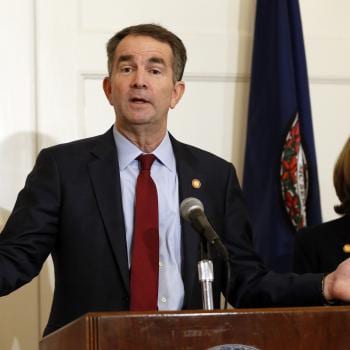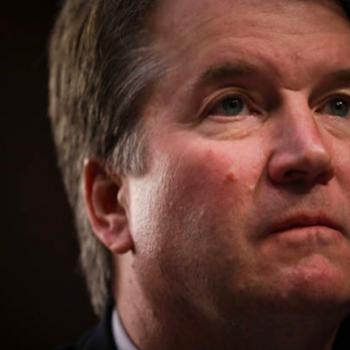If all women were believed when they said they had been sexually harassed or assaulted, the world might very well split apart, as poet Muriel Rukeyser cautioned might happen if even one woman told the truth about her life.
What the #MeToo movement has revealed is not only how widespread the many forms of sexual assault and abuse of women are, but also how widespread are the suppressive mechanisms that cause women to be disbelieved when they try to tell what has happened to them.
This is on full display since Christine Blasey Ford, a research psychologist at Palo Alto University in Northern California who has come forward with an accusation of sexual assault against Supreme Court nominee Brett Kavanaugh. Ford has claimed “a drunken Mr. Kavanaugh pinned her on a bed, groped her and covered her mouth to keep her from screaming. “I thought he might inadvertently kill me,” she was quoted as saying. “He was trying to attack me and remove my clothing.”
In my volunteer work as a rape crisis counselor, I have heard this story all too many times from many different women, some telling me what happened to them decades before, something they never dared tell. So, of course, the mechanisms of suppression of the truth of women’s lives are now out in force, spinning lies and conspiracies about Christine Blasey Ford. Conspiracies about revenge, or liberal plots and so forth are now metastasizing online.
But it is the Wall Street Journal and its sly statement about “the vagaries of memory” that is most revealing of the conservative engine of the disbelief of women. I tell you, I strongly believe when women and girls experience assault or attempted assault they never forget it,even though they may try to push it out of their minds.
The Wall Street Journal is trying to get you not to believe Christian Blasey Ford. People have the right to tell the truths about their lives and be believed. That is the bedrock of a decent society.
The mechanisms that facilitate the widespread disbelief of women demonstrate a fundamental moral error. I think the disbelief of women reveals that we are, at bottom, an indecent society because our very power structure depends on this disbelief of those who have been abused or exploited.
This society, in its customs, laws, and religions, is actually held together in its current suppressive form by the capacity of some to abuse others and then have the truth of that act disbelieved.
This societal glue is made up not only of the exploitation itself, but also by the widespread capacity to smother the truth about exploitation that is so necessary for this society to function the way it does. The millions of cries and even screams must be held in check or the cracks in the foundation of suppressive power would get even bigger and perhaps the whole thing could collapse.
Cracks in the Foundation: Christine Blasey Ford — Anita Hill
 There have been major cracks in the past. Anita Hill tried to tell what Clarence Thomas had done to her, though she was reviled and systematically disbelieved. Yet the details of her testimony are so vivid, and so characteristic of the patterns of sexual harassment, that millions of women could hear echoes of their experiences.
There have been major cracks in the past. Anita Hill tried to tell what Clarence Thomas had done to her, though she was reviled and systematically disbelieved. Yet the details of her testimony are so vivid, and so characteristic of the patterns of sexual harassment, that millions of women could hear echoes of their experiences.
Perhaps one of the most vivid scenes to emerge from Anita Hill’s testimony was about pubic hair. One time, Anita Hill testified, Clarence Thomas “got up from the table at which we were working, went over to his desk to get the Coke, looked at the can and asked, ‘Who has put pubic hair on my Coke?’” Jarring and disgusting, comments like these turn workplaces into nightmares for women.
References to the penis are common in sexual harassment, as Hill testified happened. “On other occasions, he referred to the size of his own penis as being larger than normal, and he also spoke on some occasions of the pleasures he had given to women with oral sex.”
I watched these hearings at the time, and you could see the faces of the men on the Judiciary Committee. They were a study in shock. This woman was telling the truth and that couldn’t be allowed to happen. Worlds of power were at stake.
I have always believed Anita Hill because I believed then and now that when Anita Hill encroached on the power of her boss, Clarence Thomas, he would suddenly find a pubic hair on his coke.
One thing the Judiciary Committee members never asked Anita Hill was about when these incidents would occur. Was it when she might have excelled at her work, or perhaps when she had challenged one of her boss’s points?
These committee members thought these incidents were about sex. They were wrong. They were about power and they always are. The general public couldn’t believe Anita Hill, because the small crack in the foundation of abusive power that characterizes the American workplace would have gotten too big.
The power structure of American society, its sense that elites have the right to exploit those with less power and that they do not deserve to be heard or believed, is on display right now.
To challenge this we must #BelievetheWomen, #BelieveAnitaHill, #BelieveChristineBlaseyFord. This is the path to decency as a society.
Is that possible?
I don’t know, frankly. But I do know we have to try.
Dr. Susan Brooks Thistlethwaite—Professor of Theology and President (1998-2008), Chicago Theological Seminary













